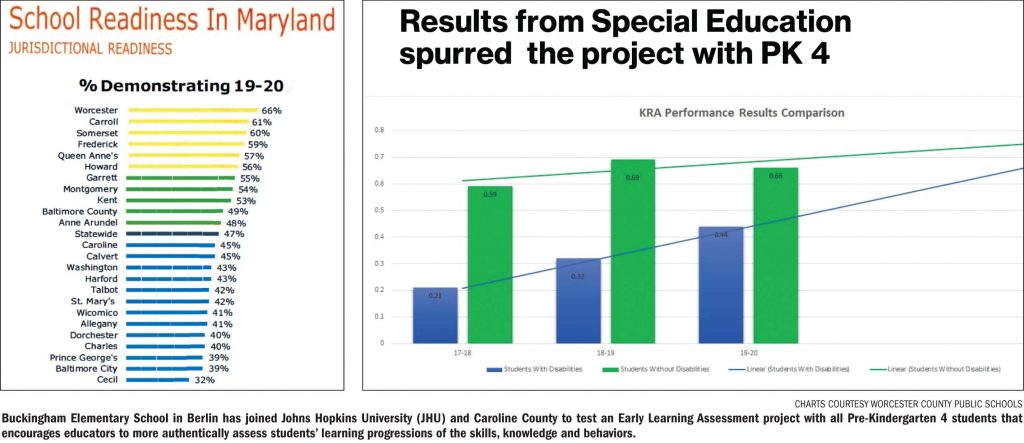Caroline County, JHU and Buckingham Elementary partner for assessments

CHARTS COURTESY WORCESTER COUNTY PUBLIC SCHOOLS
Buckingham Elementary School in Berlin has joined Johns Hopkins University (JHU) and Caroline County to test an Early Learning Assessment project with all Pre-Kindergarten 4 students that encourages educators to more authentically assess students’ learning progressions of the skills, knowledge and behaviors.
By Ally Lanasa, Staff Writer
(Jan. 28, 2021) Buckingham Elementary School in Berlin has joined Johns Hopkins University (JHU) and Caroline County to test an Early Learning Assessment project with all Pre-Kindergarten 4 students during the 2020-2021 school year.
The Early Learning Assessment is a precursor to the Kindergarten Readiness Assessment (KRA) and provides insight to students’ educational performances.
According to the presentation to the Worcester County Board of Education on Jan. 19, the Early Learning Assessment, is “a unique formative assessment tool to inform instruction, a valid instrument to show development and strengths across the whole child, designed to use teacher observation, with evidence collected over time, designed to fit into the natural flow of an early childhood setting and ensures that children are on the path for kindergarten readiness.”
Todd Hall, the county school system’s early childhood specialist, said Worcester leads Maryland jurisdictions in school readiness. During the 2019-20 school year, 66 percent of students demonstrated readiness for kindergarten.
“Are we really happy with 66 percent of our students demonstrating readiness, even though it is top in the state? Yes, but no,” Hall said. “So, we’re always looking to better ourselves to take it to the next level.”
Performance results from special education students encouraged the project for Pre-Kindergarten 4 students.
Cassidy Hamborsky, the coordinator of instruction reading for language for the school system, said the project started for special education about four years ago.
“We focused on inclusion, practices and achievement data,” Hamborsky said. “We were below the state level. Through this project and the collaboration with Johns Hopkins University and Caroline County, we were able to close the achievement gap by 16 percent for our students with disabilities.”
This was achieved through Dynamic Impact, a team-based continuous improvement process through Johns Hopkins University, she added.
“What makes it different than other strategic planning is it really focuses on the UNITED Protocol,” Hamborsky said. “UNITED Protocol is a team-based approach based on implementation plans, and it really focuses on getting the right players at the table.”
The Dynamic Impact also prioritizes fidelity.
“Our team meets quarterly with Caroline County and JHU,” Hamborsky added, while the county school system coordinators meet monthly.
The presentation also included a sample of the literary learning progressions of skills, knowledge and behaviors of the Early Learning Assessment. Students would respond to questions about a text.
Levels A-D represent developmental stages and standards that precede Levels 1-5 and allow teachers to assess children who may be at earlier stages of development, including children with disabilities and children who are English learners.
Levels 1, 4 and 5 represent the milestones at approximately 3 years of age (Level 1), entry to kindergarten (Level 4) and the end of kindergarten (Level 5). Meanwhile, Levels 2 and 3 represent a child’s progress between 3 years of age and kindergarten entry.
The project encourages educators to conduct assessments authentically.
Curriculum implications of the project for literacy are: 100 Book Challenge Pre-Kindergarten Framework, which provides a designated time for “kid-watching” to intentionally assess students; Fountas and Pinnell Interactive Read Aloud and shared reading materials, which provides formative assessment “look-fors” within each lesson; Pre-Kindergarten Fundations, which increases consistency across early grade levels with letters and sounds; and skills and goals specific to curriculum materials are aligned to skills, knowledge and behaviors in curriculum document.
As for mathematics, all curriculum standards are aligned with KRA and support learning progressions of the skills, knowledge and behaviors.
“We had our teachers this past summer go through out curricular documents and label which lessons would be good to look for with [the skills, knowledge and behaviors], so before they teach a lesson, they look at the documents,” said Christina Welch, principal of Buckingham Elementary.
In addition, formative checklists have been provided to teachers to conduct authentic assessments without interrupting instruction.
The Pre-Kindergarten math assessment has also been revised, so that it could be administered with PearDeck.
Board member Elena McComas asked if students, who are behind developmentally, are given “grace.” The presenters assured her that the Early Learning Assessment project does not compare students, but rather assesses students on an individual basis.
